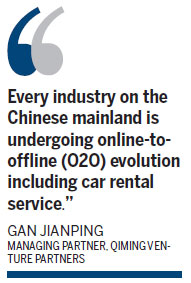More mega players likely to join mainland VC boom
Updated: 2014-11-27 06:32
By Gladdy Chu in Hong Kong(HK Edition)
|
|||||||||
|
The mainland car service provider eHi Car Services Ltd was floated on New York Stock Exchange and raised a total of $120 million on Nov 18. Asian News |
Mainland private equity (PE) investment market entered a high growth period over the last few years. Some of the companies with PE capital injection are becoming eligible for a market listing.
This would be beneficial to Hong Kong because many such companies would seek a listing on the Hong Kong stock exchange while others would look further ahead at New York or other international markets.
"Greater IPO demand is positive to Hong Kong equity market since listing in Hong Kong is relatively easier and the local market enjoys a global exposure," said Dicky Wong, executive director of research at Kingston Securities Ltd. "However, more ambitious enterprises would want to float in the US for larger scale effect," he said.
As the latest mainland company to float in the US, Chinese leading car service provider eHi Car Services Ltd raised a total of $120 million. Qiming Weichuang Venture Capital Management Co Ltd, a venture capital investment company focusing on fast-growing high-tech companies, holds a significant stake in eHi.
"Every industry on the Chinese mainland is undergoing online-to-offline (O2O) evolution including car rental service," said Gan Jianping, managing partner of Qiming Venture Partners. "We think mobile Internet is the biggest growth area in the next 10 years on the Chinese mainland," he added.
Qiming Venture Capital invested $5 million in eHi in 2008 and another $20 million in 2009. Qiming held a 11.7 percent stake in eHi prior to the IPO, which valued the company at $686 million.
In 2014, over 10 mainland Internet companies went public in the US including Jack Ma's Alibaba and Jingdong, an online electronics retailer.
"It's a great signal to Chinese venture capital companies (VCs) since more global investors have begun to take note of the investment value of Chinese internet companies," Gan said.
On the first day of Asian Venture Capital Journal's Private Equity Forum held on Nov 11 in Hong Kong, nearly every speaker talked about the big online sales fest on that day.

Statistics show that online sales in that single day at taobao.com, the e-commerce platform controlled by Alibaba, amounted to 24.3 billion yuan.
"Offering online service and combining it with offline business is a trend in all industries," said Thomas G Tsao, co-founder of Gobi Partners, a Shanghai-based VC company. "Consumer behaviors have told us that they are shifting from computer-based to mobile-based," he said.
Akio Tanaka, co-founder and managing partner of Infinity Venture Partners, said that his company's own research showed that China ranked as the second after the US in app store downloads by volume. But revenue only ranked fourth globally. By contrast, Japan ranked fifth in download volume but first in revenue, exceeding the US.
"Chinese mobile Internet industry is extremely competitive now," Gan said. "In the past 10 months, 500 million new smartphones are sold on the mainland and most application design companies are still in the stage of usage acquisition," he said.
To VC companies, an effective revenue model is one of the key considerations in deciding whether or not to bet on a mobile Internet enterprise.
"Gaming, e-commerce, advertising and value-added revenue, including subscription fees, are the main income sources," Gan said. "VC companies are much interested in apps designed for location positioning, voice transmission and image refinement such as Dianping, Wechat and Meitu."
Tsao agrees. "I am quite optimistic about the future of mobile advertising, and they are in the vanguard of this growth," he said.
"As one of the world's largest mobile markets, the number of mobile Internet users on the Chinese mainland reached 520 million in 2014, which outnumbered the PC Internet users and doubled TV users," said Clement Huang, chief product officer of Madhouse, a mobile advertisement company on the mainland. "Mobile medium is absolutely the first choice for advertisers now," he said.
According to Huang, the mobile marketing industry on the mainland skyrocketed in the past three years. Madhouse's average compound annual growth rate was over 100 percent in each of the three years to 2013.
"As mobile technology develops, tailor-made mobile advertisements will become increasingly popular," Huang added.
The online-to-offline evolution, however, has raised concerns among VC companies on the mainland.
"Policy uncertainty is still the biggest problem for us," Gan said. Frequent changes in the regulatory regime have greatly increased the risks of investors in Internet companies, he said.
About 80 percent of Qiming Venture Capital's funding came from US university endowments and pension funds. Other stakeholders include Chinese high net worth individuals and large financial institutions.
"We are seeing the increased involvement of institutional investors in China's venture capital sector, though much of the funding is still from overseas," Tsao said, "We hope that financial market reforms (on the mainland) will provide greater incentives for domestic institutional investors to jump onto the VC bandwagon," he said.
According to Asian Venture Capital Journal, exits in Asia amounted to $49.4 billion so far this year. "2014 is also seeing secondary deals playing an increasingly important role in the exit equation," it said.
Baidu bought online TV PPStream for $370 million in 2013 and merged it with its own subsidiary iQIYI.COM, a video portal. The transaction yielded Qiming Venture Capital Partners an 800 percent book return on its investment in PPStream.
Now, more and more mega players such as Baidu, Alibaba and Tencent have established their own strategic investment ventures to join the VC game, Gan said. The competition "will pose some pressure on VC companies like us".
gladdy@chinadailyhk.com
(HK Edition 11/27/2014 page9)
